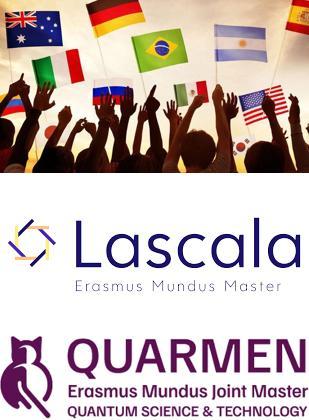
International GS Physique
Research within the Graduate School of Physics (GSP) has a strong international component, both through the involvement of GSP members, teams and laboratories in major international projects (in particular for the P2I and Astrophysics axes) and through their thematic international collaborations and participation in networks of collaborators involving numerous research centres and universities worldwide. An indicator of this is the large number of international and European research contracts that GSP members secure to support their activities (ERC, EIC, Marie Skłodowska-Curie actions, PhD and post-doctoral training networks, long-term visitor programmes, bilateral agreements).
The international attractiveness of our physics training programmes is also highlighted by the ever-increasing vitality of academic exchange agreements, particularly Erasmus+: the GSP benefits from some fifty Erasmus+ and Erasmus+ ICM agreements for study mobility at all levels, internships and staff mobility, 15 bilateral agreements with partners on five continents, and several double degree agreements at the Master’s and/or Doctorate levels.
The international strategy of the GSP relies heavily on tools, particularly European, to promote coordination and integration of training and research. In this respect, we can underline the consecutive successes of the Master Erasmus Mundus projects LASCALA (LArge SCale Accelerators and LAsers, with the Universities of Lund, La Sapienza and Szeged) and QUARMEN (QUAntum Research Master Education Network, with the Universities of Porto, La Sapienza and Toronto), which are coordinated by members of the GSP, and financed by the European Union for a period of five years in 2020 and 2021 respectively. These actions consolidate the international visibility of Physics at Université Paris-Saclay, while attracting and training tomorrow's dynamic forces in line with the scientific objectives of our research teams. It is with this objective in mind that the GSP will pursue its actions, in harmony with national and European strategies, both in the establishment of cooperation and exchange agreements and in the provision of degree courses. Some actions, such as host scholarships for long-term visits, are a common need for many Graduate Schools and can be centralised at University level. Some of the existing schemes (such as the IDEX International Master’s Scholarships of Université Paris-Saclay) will, however, have to be supplemented by the GSP in order to strengthen its capacities and correspond to its strong international appeal. Other actions require calls for projects that must be adapted to the specific needs of physicists in all their diversity. This is particularly true for large-scale and high-visibility events: international conferences and workshops (in the laboratories, the GSP, and within the Institut Pascal), international thematic schools, doctoral and post-doctoral mobility, etc. In addition to what is done centrally at the University, particularly at the European level, the GSP monitors opportunities and responds to relevant calls for projects (national, bilateral, European).

- Erasmus+ and Erasmus+ MIC agreements for study mobility at all levels, internships and staff mobility
- Master Erasmus Mundus LASCALA (Large Scale Accelerators and Lasers) with the Universities of Lund, La Sapienza and Szeged)
- Master Erasmus Mundus QUARMEN (QUAntum Research Master Education Network) with the Universities of Porto, La Sapienza and Toronto)
- Host scholarships for long-term visits
- IDEX International Master’s Scholarships of Université Paris-Saclay
- Call for proposals of the Institut Pascal